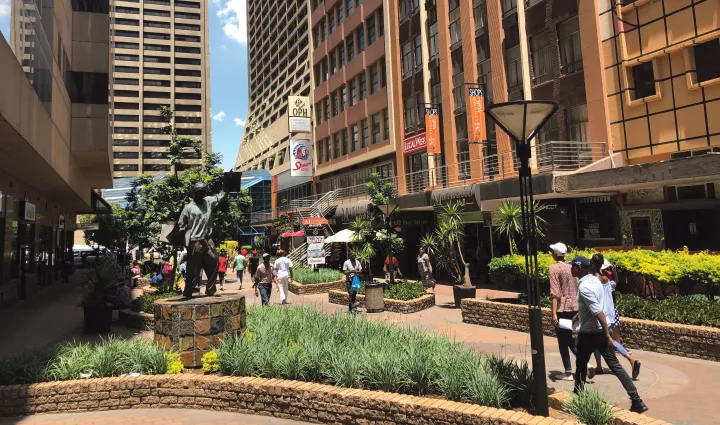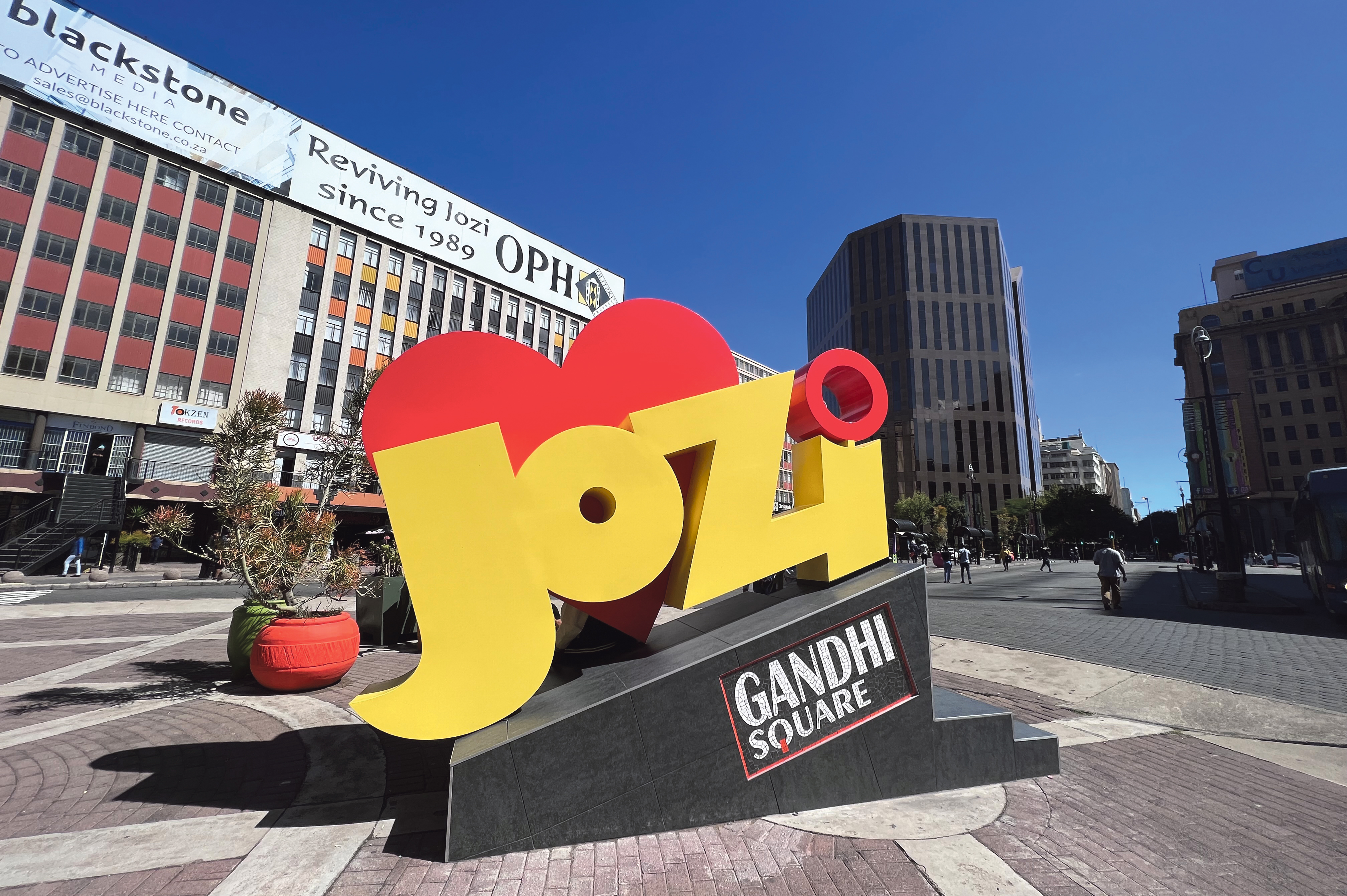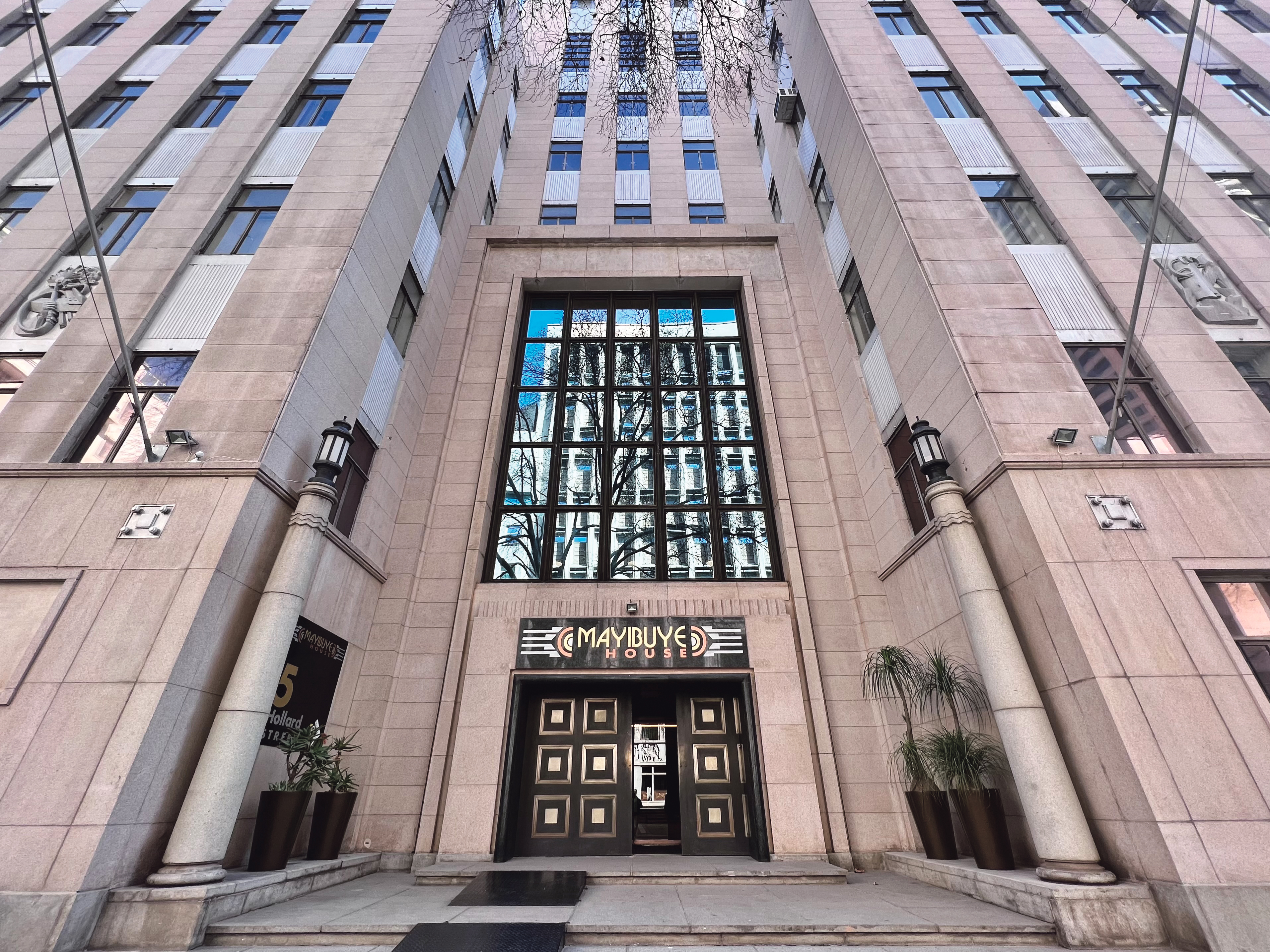INNER-CITY REVIVAL
Joburg CBD is slowly shaking off its ‘hellhole’ status — thanks to the private sector

The private sector and various organisations have come to the rescue, even enforcing bylaws.
Despite doom-and-gloom stories emanating from the Johannesburg central business district (CBD), all hope is not lost.
In the heart of the inner city, thanks to the private sector, are pockets of vibrant, flourishing blocks of redevelopment that compare favourably with those of any first-class overseas city.
The private sector and NGOs have taken over and are even enforcing bylaws, with retailers, banks and offices queuing to get space. The developers have gone so far as to take leases over roads, privatising them to create spaces within the inner city that are clean, secure and modern, and that are currently at an average of 99% occupancy.
And, although they are paying the City of Joburg additional money every month for the upkeep of these areas, they receive no financial benefits in return. Obtaining private leases over certain streets from the City enables them to enforce bylaws controlling street trading, traffic and parking.
Gerald Olitzki, a pioneer in redeveloping the inner city, and whose company owns several buildings in the heart of the CBD, said the perception of the CBD being a hellhole and out of control is indeed real, with the situation becoming worse in recent years: Deteriorating services, fires and uncontrolled hijacked buildings.
However, there are areas in which people can walk about quite safely during the day or night without fear, being able to shop, bank, study or enjoy a meal, he said. Gandhi Square, which Olitzki redeveloped, is just one of those spaces. Others are the Mining, First National Bank and Standard Bank precincts, which are privately managed.
We enforce bylaws, fix pavements and potholes, provide street furniture and art, landscaping and 24-hour security.
All the buildings around Gandhi Square have been renovated and sold, and the area is buzzing with major retailers such as Dis-Chem and Spar, the EFF offices, a Unisa campus, all banks, restaurants and upmarket brand-name clothing and shoe stores.
The secret to these successful upgrades lies in public-private partnerships, although the private side of it alone is responsible for the successes, said Olitzki.
“The Joburg council appears to be unable and unwilling to get things right. Funds are allocated and sometimes misappropriated. To add to the problem, the technical and bureaucratic systems hinder development. The City is failing to maintain streets, carry out any improvements or enforce bylaws.
“The private sector, which has taken over these safe precincts… we enforce bylaws, fix pavements and potholes, provide street furniture and art, landscaping and 24-hour security in their areas.

Gandhi Square has become a hub for shoppers, tourists and students. (Photo: Supplied)
“Revival is a slow process and companies that develop have to be prepared to look after their own environments and even go as far as getting private leases over streets. By enforcing basic bylaws, we can easily go ahead with our developments without fear, and thereby create hundreds of jobs.”
Olitzki started buying property in Gandhi Square, where he first practised as an attorney. People thought he was crazy to invest in the then already declining CBD, but this led to other developments in the Fox Street/Main Street area.
Past failures
Olitzki says many developers who have come into the inner city do not understand the social fabric or dynamics of the area and that is why many projects around the CBD have failed after lavish promises of upgrading it fell through.
The once-trendy Maboneng is a prime example. A few years ago it was the “in” place to eat, rent and play, but it has now largely fallen into disrepair after the owners went bankrupt.
The much-vaunted Kopanong project touted by the Gauteng Legislature is another project that has contributed to the decline of the inner city.
Kopanong initially involved 10 inner-city buildings that were to become interlinked government departments through a series of walkways and underground tunnels. The project was started in 2003 with the purchase of several buildings, but they have been standing empty, some partially renovated, then left to disintegrate, creating an eyesore in the city centre. The go-ahead for the project was announced several times, but has never materialised.
Capital investment and management are not happening in Joburg. The level of service has diminished to virtually nothing.
Some of the partial alterations carried out after 2005 resulted in the destruction of important panels by artist Edoardo Villa and the alteration of the Rand Water Board Building, where the architectural significance of the structure has been ruined.
But there is yet another glimmer of hope with the establishment of the Walkable Network, a partnership-based package of interventions targeting streets and public spaces to create a clean, safe and welcoming inner-city experience between the already established safe precincts and new ones that are being developed.
Read more in Daily Maverick: Downtown is looking up – Joburg inner-city projects bring work and hope to its young residents
This is an initiative of the Johannesburg Inner City Partnership (JICP), aimed at improving walkability along streets and in other public places through pedestrianisation, public art, street furniture, lighting, landscaping, signs, safety and cleanliness interventions through partnerships with public, private and civil society stakeholders from the property, design, security, waste management, academic and food production sectors.
The City has incorporated the Walkable Network as one of the key non-motorised transport projects in the Inner City Transport Master Plan currently under way.
David van Niekerk, chief executive of the JICP, agrees that the inner city is deteriorating.
“There is no denying that we are in a worse position than ever before. The CBD should be the most important area that investors want to come into. It should be a primary node of any CBD, then investment will follow. But capital investment and management are not happening in Joburg. The level of service has diminished to virtually nothing.”
The informal sector, which is the future of the country, he said, is doing well in the inner city, as is the retail sector, because people will always have to buy necessities.

The old Chamber of Mines building is undergoing renovation. (Photo: Supplied)
The JICP has established a pilot route for the Walkable Network covering Main and Fox streets (east/west) and Joubert and Rissik streets (north/south). The route already has a strong pedestrian presence, with some pedestrian-focused projects under way. The intention, Van Niekerk said, is for the pilot to integrate with and support existing interventions along the route.
The second phase will start once adequate progress has been made on the pilot targets and then, over the longer term, it will be completed to cover the entire network, linking with the wider metropolitan public transport systems, as envisaged by the Inner City Transport Master Plan.
Specific areas of intervention are security, traffic and emergency management, and community cleaning, recycling, upcycling, repairs and maintenance. Projects will be identified by task teams, with some immediately implementable where funding and authority approvals are not required. Funding for projects and operations with a cost component will be sourced from the public, private and civil society sectors.
The City of Joburg did not respond to repeated requests for comment. DM
This story first appeared in our weekly Daily Maverick 168 newspaper, which is available countrywide for R29.






















 Become an Insider
Become an Insider
So the eff have offices in the RENOVATED city centre,soo typical, would not be otherwise as the thieving sods say one thing but do the other.
Thank goodness for the “private sector” – the very same who built it in the first place. Unfortunately, I suspect they are wasting their time and money yet again – this is Africa after all!
Africa is a large place. You’d do well to get out once in a while and see the rapid developments taking place in many countries across the continent instead of just lazy tropes. Maputo today is unrecognizable from what it was 20 years ago, ditto Nairobi, Lagos, Kampala, Luanda, Dar and many many other cities I travel to on a regular basis. In Botswana, when they’d built a new CBD, the key theme at a property conference was focusing on lessons from Joburg – and to avoid the old CBD becoming a rundown cesspit like ours.
The uniquely South African (from all races) dismissal of the huge changes taking place across the continent today reveals a laziness and a dismissive discrimination which results in companies from Asia, Latin America, the Middle East and Europe – and even Australia and Canada – eating our lunch from under our noses. I don’t know if it’s sad, pathetic, infuriating or a combination of all of these.
You don’t mention Namibia where we visited recently. Everything works. There are no potholes. The mainly gravel roads outside the city are constantly levelled. In the townships there is no litter, and no signs of illegal water or electricity connections. All are signs of an orderly well managed society. As you say South Africa, with the exception of the Western Cape,is the odd man out and will rapidly fall behind much of the rest of Africa. It is tragic but can be fixed. Let’s hope that an appropriate coalition government arises after May 29th.
Hi Peter, you’re quite correct! I was in Namibia not too long ago and we actually spotted a bit of litter in downtown Windhoek. My driver said “In Namibia we call this the South African national flower!”
Maybe you travel different. If you travel by road across Namibia there are areas where fences were flattened because they failed under the stress of plastic bags blown against them.
If you travel by road through the poorer villages in Botswana, the same scourge of litter is sad to see. Same Zambia, have not been Zimbabwe a while so can’t comment.
It blows my mind that, even if the council is not doing its job, that people just discard garbage. Whether out the window or turning any open land into a junk yard.
You don’t mention Namibia where we visited recently. Everything works. There are no potholes. The mainly gravel roads outside the city are constantly levelled. In the townships there is no litter, and no signs of illegal water or electricity connections. All are signs of an orderly well managed society. As you say South Africa, with the exception of the Western Cape,is the odd man out and will rapidly fall behind much of the rest of Africa. It is tragic but can be fixed. Let’s hope that an appropriate coalition government arises after May 29th.
It is a little while back but my experience of the 15 major African cities across east, west and southern africa that I visited for work was largely positive. With a few exceptions most were clearly on an upward trajectory which was very much in contrast to my home city of joburg. The work I was doing gave an insight into the relative performance and competence of roles in a common set of business processes across the countries. What leapt out from that was that every one of the roles in every country was performed more effectively and generally with a lower headcount than in SA. Our relative underperformance when compared to those countries comes as no surprise to as a result.
Absolutely! It’s not every country or city that’s progressing, but there is a trend in countries with more progressive governments (not ‘progressive’ in the lunatic fringe leftwing sense here), that they’re attracting investment, building and maintaining infrastructure and generally doing a better job of it than most of ours. And actually planning – how about that!
If you have been living in Joburg as long as I have, you would not be so easily excited about yet another revival. Lots of people with great intentions, some rosy glasses equipped investors and then a few years later, back to squalor….
Bit of dangerous road, although it makes sense for the country to try and regain some of the glitter and geld once found in Joburg. But have security and law and order been outsourced to the point where the various useless police services are no longer needed?
And how will it play out when there are the inevitable “deaths in custody,” resulting from enforcing by-laws against drink and drugs — race riots or just a shrug as with SAPS cases…
Hats off though to those trying to stop the slide.
Some years ago I visited Maboneng at night. The parking area which I usually used (we used to go there quite often for lunch) was full, so I parked a couple of blocks away and promptly lost my bearings. A security guard walks over and asks if I’m OK. I say yes, but I’m trying to get to the Chalkboard and I’m not sure how to get there from here.
Guard then gets out his walky talky. Then says to me “do you see that man with a torch at that corner over there? That is a colleague of mine. Go to him, he’s expecting you, he will direct you.” And that guard, in turn, sent me to another colleague with a torch at the next corner. And so on. And we got there and had a pleasant time.
OK, that was then, and apparently now the company that was running Maboneng has collapsed. But I tell this to illustrate just how well some of these precints can be run.
Here we go again… 𝘈𝘨𝘢𝘪𝘯.
The old CBD is a perplexing place (as, by the way, is Berea). Some blocks, or some precints, are really nice with well maintained buildings. Right next door you can have a slum.
Valiant attempts at trying to re-establish the standards we once took for granted.
Drops in the ocean of decay and disinterest, which will unfortunately return to their former decrepit state in the years ahead as the tide returns and washes over the good work.
History has shown that this cannot withstand the overwhelming forces of neglect that drive everything to their lowest common denominator.
“The City of Joburg did not respond to repeated requests for comment. DM” – need one say more?
Enjoy the temporary pleasures of the precincts.
“And, although they are paying the City of Joburg additional money every month for the upkeep of these areas, they receive no financial benefits in return.”
That says all you need to know. We pay the thieving scum to ruin the city and then we pay them more for the privilege of paying to fix bits of it ourselves.
99% occupancy???? By paying occupants? That would be a great property investment if it were true!